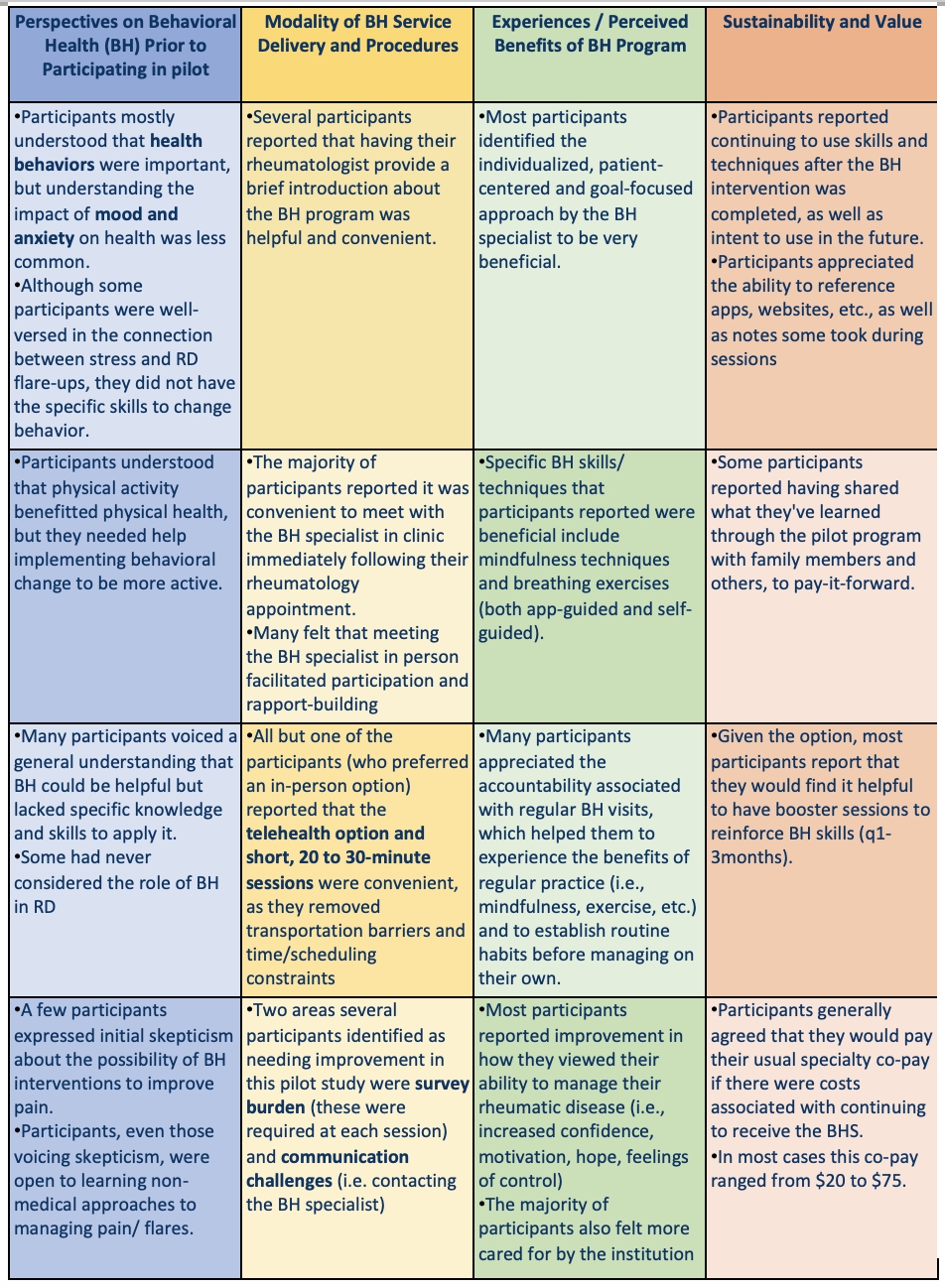Session Information
Date: Monday, October 27, 2025
Title: (1248–1271) Patient Outcomes, Preferences, & Attitudes Poster II
Session Type: Poster Session B
Session Time: 10:30AM-12:30PM
Background/Purpose: Rheumatic diseases (RD) often cause pain, fatigue and disability. Depression and anxiety are prevalent comorbidities in RD and ideally managed with behavioral health (BH) strategies. Programs that integrate BH services into rheumatology remain underexplored. Our group conducted a single-arm pilot BH program integrated within rheumatology clinic. This qualitative study explores stakeholder perspectives on barriers and facilitators of integrating BH in rheumatology.
Methods: Adult patients with any RD were invited to participate in a novel BH program during their rheumatology clinic visit. Participants completed a goal elicitation tool and met with the BH specialist after their visit to discuss the study and determine which of 3 eligible BH goals to focus on. Participants engaged in up to 8 weekly telephone sessions with the BH specialist. After the final session, participants completed a satisfaction survey and semi-structured interview to elicit feedback. Referring rheumatologists and the BH specialist were also interviewed. We used Rapid Qualitative Analysis to identify thematic domains and illustrative quotes.
Results: Of 54 patients enrolled, 39 engaged in BH intervention sessions beyond baseline, and 27 completed post-intervention interviews. Interviewees were primarily female (77.8%) and White (81.5%), with an average age of 56 years. Participants (n=27) selected the following goals: managing mood or stress/anxiety (52%), managing pain (26%), and increasing physical activity (22%). We identified 4 thematic domains: pre-existing perspectives on BH, recruitment/delivery procedures, experiences/perceived benefits, and sustainability/value (Figure 1). While some understood the connection between BH and RD prior to the study, participants expressed a lack of specific skills/motivation to change behavior. Key benefits included the patient-centered, goal-oriented approach and accountability provided by regular sessions (Figure 2 lists illustrative quotes). When asked if BH services added value to their rheumatologic care, all interviewees responded positively, “Yes, definitely” (81%) or “Yes, I think so” (19%). The two rheumatologists and BH specialist provided unique perspectives on barriers and facilitators that could enhance future feasibility and success of a BH program (Figure 3).
Conclusion: The integration of an individualized, goal-focused BH intervention into rheumatology clinics is feasible and perceived as beneficial by patients, rheumatologists and the BH specialist. Results from this pilot program will inform the development of an RCT to evaluate clinical and behavioral outcomes in this population.
 Figure 1. Rapid Qualitative Analysis (RQA) Matrix of Patient Interviews (Nf27)
Figure 1. Rapid Qualitative Analysis (RQA) Matrix of Patient Interviews (Nf27)
.jpg) Figure 2. Illustrative quotes from Patient Interviews
Figure 2. Illustrative quotes from Patient Interviews
.jpg) Figure 3. Rheumatologists and BH Specialist Interview Highlights
Figure 3. Rheumatologists and BH Specialist Interview Highlights
To cite this abstract in AMA style:
Teaw S, Link-Malcolm J, Ghebranious Farag M, Patterson D, Foster J, Bereket S, Bajaj P, Wahid U, Solow E, Barton J, Makris U. Integrated Behavioral Health Services for Patients with Rheumatic Diseases: Qualitative Analysis of a Pilot Study [abstract]. Arthritis Rheumatol. 2025; 77 (suppl 9). https://acrabstracts.org/abstract/integrated-behavioral-health-services-for-patients-with-rheumatic-diseases-qualitative-analysis-of-a-pilot-study/. Accessed .« Back to ACR Convergence 2025
ACR Meeting Abstracts - https://acrabstracts.org/abstract/integrated-behavioral-health-services-for-patients-with-rheumatic-diseases-qualitative-analysis-of-a-pilot-study/
